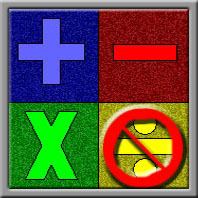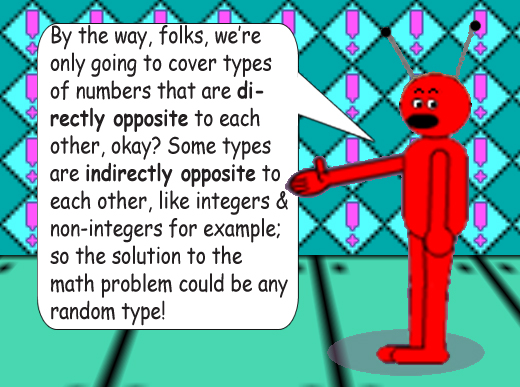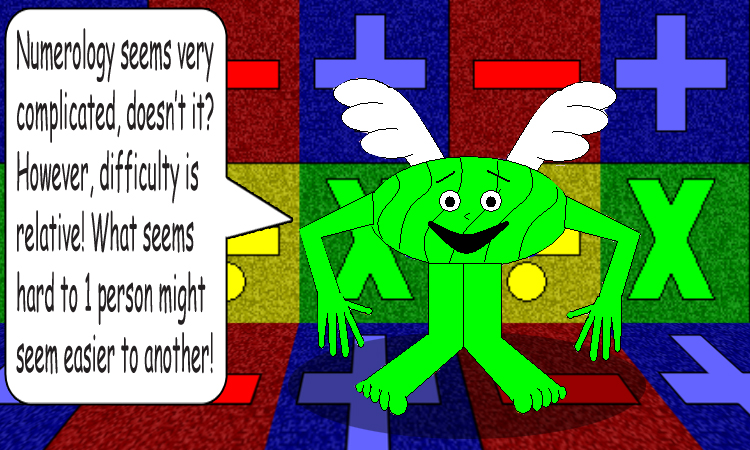What Type of Number Will You Get?
This Web page is about the types of numbers you get as solutions/correct answers to math problems depending on the arithmetic operation used. (Except division; out of all 4 arithmetic operations, division is the most unpredictable & tends to gives you random types of quotients!) For more information about number types, see the page entitled "Types of Numbers".


You can select the 3 Different Pairs of Directly Opposite Number Types here:
- Even Numbers & Odd Numbers
- Positive Numbers & Negative Numbers
- Real Numbers & Imaginary Numbers
First, Even Numbers & Odd Numbers
Even + Even = Even
Odd + Odd = Even
Even + Odd = Odd
(Addition is Commutative!)
Even - Even = Even
Odd - Odd = Even
Even - Odd = Odd
Odd - Even = Odd
Even × Even = Even
Odd × Odd = Odd
Even × Odd = Even
(Multiplication is Commutative!)
Positive Numbers & Negative Numbers
Positve + Positive = Positive
Negative + Negative = Negative
Positive + Negative = Sign That's Greater In Absolute Value or Zero If They're Additive Inverses
(Addition is Commutative!)
Positive - Positive = Positive or Zero If Both Numbers Are Equal or Negative If 2nd Number Is Greater In Absolute Value
Negative - Negative = Negative or Zero If Both Numbers Are Equal or Positive If 2nd Number Is Greater In Absolute Value
Positive - Negative = Positive
Negative - Positive = Negative
Positive × Positive = Positive
Negative × Negative = Positive
Positive × Negative = Negative
(Multiplication is Commutative!)
Finally, Real Numbers & Imaginary Numbers
Real + Real = Real
Imaginary + Imaginary = Imaginary
Real + Imaginary = Complex
(Addition is Commutative!)
Real - Real = Real
Imaginary - Imaginary = Imaginary
Real - Imaginary = Complex
Imaginary - Real = Complex
Real × Real = Real
Imaginary × Imaginary = Real
Real × Imaginary = Imaginary
(Multiplication is Commutative!)
Note: Imaginary numbers can flip positivity & negativity around in the multiplication of complex numbers!
In conclusion, these are the only 3 different pairs of directly opposite number types because with indirectly opposite types, the number type of the solution is random! Multiplying an irrational number by an irrational number, for example, could give you either a rational product or an irrational product. The square root of 2 multiplied by itself gives you 2, which is rational; however, the square root of 2 multiplied by the square root of 3 = the square root of 6, which is irrational! Also, the square root of 2 + the square root of 3 ≠ the square root of (2 + 3), which is 5; but yes, the sum of those 2 irrational numbers is also irrational; it's approximately equal to π + .0046717164... But adding 2 irrational numbers might give you a rational number! (The square root of 2 + (1 - the square root of 2) = 1!)

Back to Index Page Back to Math Trick Menu
© Derek Cumberbatch



